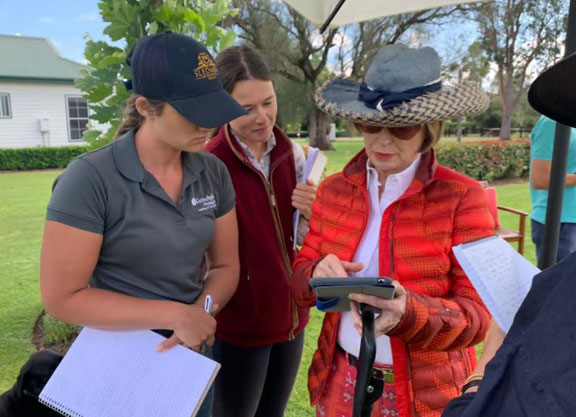By Lowri Allen
In Global Views, Godolphin Flying Start trainees provide insight into practices experienced and observations taken on their worldwide travels. Second-year trainee Lowri Allen shares the news of the course's syllabus change that will see them attend the Magic Millions Gold Coast Yearling Sale.
The Godolphin Flying Start Programme offers a unique opportunity to spend time working in and learning about the Thoroughbred industry in five major racing jurisdictions; Ireland, Britain, America, Australia and Dubai. The 2019-2021 class of trainees are now in the fourth phase of the programme, spending time in the capital of Australian Thoroughbred breeding, the Hunter Valley, in New South Wales. Prior to this we spent time in Kildare, Newmarket, and Lexington, learning a tremendous amount about the Irish, British and American Thoroughbred industries.
Spending time shadowing bloodstock agents at the sales forms an integral part of the programme's syllabus, and consequently we attend many of the major sales internationally. Many of the programme's graduates have gone on to be highly successful in the bloodstock field.
Ordinarily, trainees would finish the Australian phase of Flying Start in mid-December. But a change resulting from previous year's feedback, which suggested that the Australian phase should be extended to provide trainees with the opportunity to attend an additional major yearling sale, will see us staying in Australia until the end of February for the Magic Millions Gold Coast Yearling Sale.
The Magic Millions Gold Coast Yearling Sale is one of Australia's premier yearling sales and this year, a quality line up of 1273 lots has been confirmed by vendors for the seven-day extravaganza. Yearling inspections by trainers and bloodstock agents are currently well underway as they tour the Hunter Valley stud farms looking for the next champion. Legendary trainer Gai Waterhouse places great value in conducting stud farm inspections and is usually one of the earliest visitors on the stud farms. This practice is a noticeable difference between Australia and other jurisdictions, where prospective purchasers might see the yearlings for the first time at the sales complex. From my limited experience, it seems hugely beneficial to see a horse on its home turf and observe how it develops from mid-way through its sales preparation, to the finished product on sales day.
Further to this, the practice of pre-sales inspections was, I think, a major contributor to the success of the 2020 Inglis Easter Yearling Sale. It was the first major sale to take place during the coronavirus pandemic, and it was held at a time when many countries and Australian states were in lockdown. Whilst the sale was conducted with online bidding in a virtual auction format, many prospective buyers had already had the opportunity to view the yearlings through stud farm inspections. Consequently, there was greater buyer confidence and the sales results held up remarkably well considering that the global Covid-19 pandemic drove some challenging economic factors.
Whilst the traditional sales calendar has been kept broadly in line, digital sales continue to gain in popularity. Many in the industry say that the pandemic has pushed forward their usage. Inglis held its first digital sale back in May 2017 and the platform has grown steadily since then. This year was one of exponential growth, with the platform's gross having doubled that of 2019 by the end of November, being just shy of $50-million.
Across the waters, at Keeneland in Lexington, similar growth was shown at their digital sales. Keeneland debuted its first digital sale in June, offering 31 horses. This number was more than doubled at the December digital sale where 70 horses were offered. The bloodstock industry has been resilient and flexible during 2020, with online bidding and digital sales rapidly establishing themselves alongside those of a traditional format.
The opportunity to learn about and experience sales across all the major racing jurisdictions has been an advantageous aspect of the programme. In Australia, syndicates form a major part of racehorse ownership, with one in every 244 Australians owning a share in a racehorse. In America and Europe, syndication forms a much smaller part of racehorse ownership and syndication groups take up far less of the buying bench at sales in these countries. Another difference is the speed of auctioneering, which is noticeably quicker in Australia and allows the working hours for sales staff to be more favourable than those in Europe, where sales could often go on late into the evening.
The applications for the 2021-2023 intake of Godolphin Flying Start trainees are currently open and close on Monday, Feb. 8, 2021. For more information and to apply, click here.
Not a subscriber? Click here to sign up for the daily PDF or alerts.






